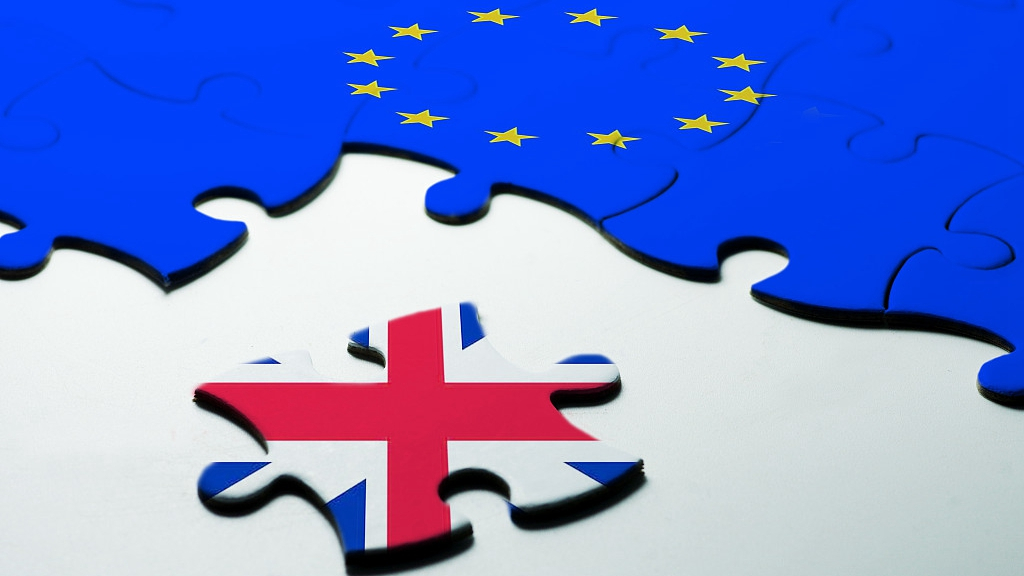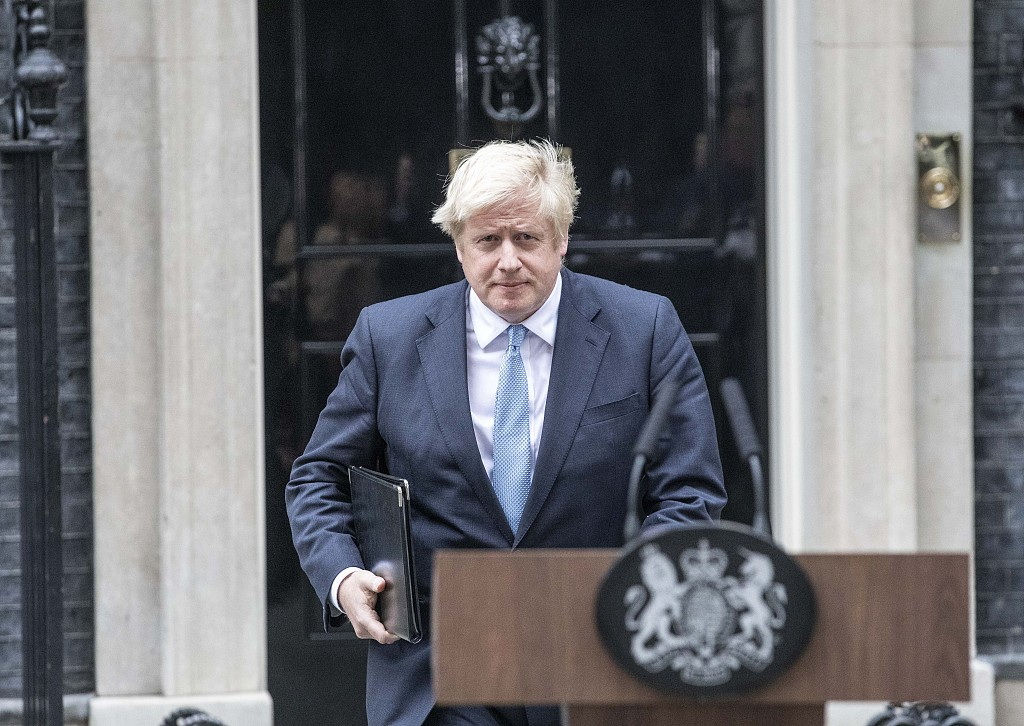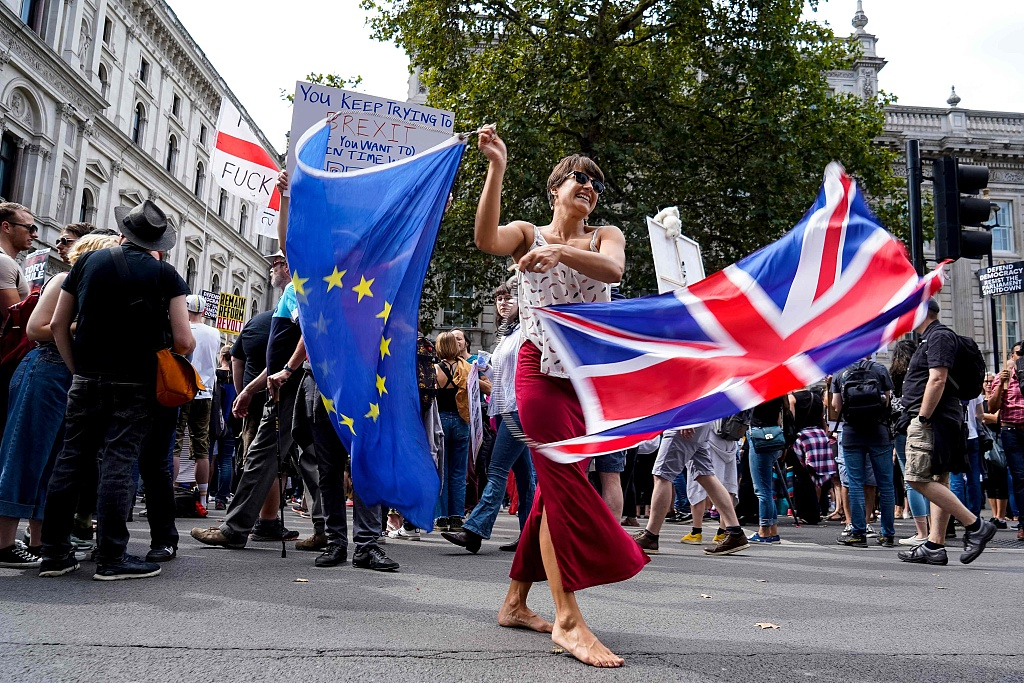

Editor's note: Richard Fairchild is an associate professor at the Finance of School of Management at the University of Bath. The article reflects the author's opinions, and not necessarily those of CGTN.
It's been a very dramatic week in the Brexit saga after British MPs returned to work following their long summer holidays.
The Prime Minister, Boris Johnson, had already forced prorogation (suspension of Parliament), agreed by the Queen, days before Parliament was due to reconvene. This means that Parliament will be open for this week only, then being suspended from September 9 until October 14.
Some MPs, and many members of the public, have argued that this is undemocratic, and that Mr. Johnson is using this suspension to force his no-deal Brexit through without any debate or opposition in the House of Commons from MPs.
Indeed, as a demonstration of the games being played, the Independent Newspaper revealed that secret documents and emails have been leaked to a Scottish Court, showing that Mr. Johnson has already been planning in mid-August to suspend Parliament in September.
One email, sent to Mr. Johnson and Dominic Cummings, his chief aide, on August 16, entitled "Suspending the Session," asked Mr. Johnson if he wished to suspend Parliament. He gave a positive answer. Yet, even until nine days ago, he continued to deny that he was going to suspend Parliament.
Johnson’s shock plan to prorogue was announced "at the last minute", only a matter of days before Parliament returned. In my opinion, he did this so that his opposition would have little time to prepare for suspension, thinking that they would have the whole of September and October to debate and deal with Brexit. Furthermore, it is in Boris Johnson's character that he likes a bit of drama and surprise.

Boris Johnson makes a statement in Downing Street urging support for his Brexit plans, September 2, 2019. /VCG Photo
Thus, it was always going to be a dramatic week, as the imminent suspension of Parliament means that MPs only have this week to act to stop a very damaging no-deal Brexit. The action began on the first day after the summer recess, September 2.
As Boris Johnson stood to give his first speech, at that precise moment, one of his Conservative MPs, Phillip Lee, stood up and crossed the House of Commons, amid tumultuous uproar and applause, to sit with the Lib Dems: he had defected from the Conservative Party to join the Lib Dems.
In that moment, Mr. Johnson had lost his slender majority of one. He proceeded to try to say that we would be leaving Europe on October 31, even with no deal. He also argued that, if the House took away his power to threaten the EU that we would be prepared to leave without a deal on October 31, this would take away our bargaining power.
But Johnson looked flustered and less confident than usual as he realized that his majority and power had gone.
In an attempt to retain control, he had already threatened Conservative MPs who defected to vote with Labour and other opposition parties against his plans to take Britain out on October 31 with a no-deal: he had threatened that they would be sacked from the Conservative Party.
However, 20 of these Conservative MPs felt so strongly about this issue that they "put Britain first", and refused to give in to the threats. Thus, in an evening session on September 2, they joined the opposition, and voted against Johnson’s no-deal Brexit plans for October 31.
Boris Johnson reacted on September 3 by putting forward a motion that he would call a general election on October 14, three days before the EU Summit. The House of Commons had a vote on this, and Mr. Johnson was again defeated. Why did the MPs vote against a general election? It would seem that they would want it, especially the Leader of the Opposition Labour Party, Jeremy Corbyn.

A demonstration against the British government's move to suspend parliament in the final weeks before Brexit outside Downing Street in London, August 31, 2019. /VCG Photo
Well, their fear is that, if the General Election was agreed at that point; then, after Parliament is suspended, there is nothing to stop Mr. Johnson shifting the date of the election until after October 31, and forcing through Brexit with no-deal on October 31 anyway.
So, those parties opposed to no-deal Brexit wanted an assurance in place that this was not going to happen, before voting for a general election. This is where the bill, voted for on Monday, comes in. The next stage was to first push this through the House of Lords to get agreement there, and then the House of Commons.
Well, in an unprecedented quick turnaround, on September 4, the Bill has been pushed through the House of Lords in one day, in a third defeat in a week for Mr. Johnson. It was expected that pro-Brexit peers in the House of Lords would oppose and block the bill, but it was passed, and all stages in the Lords will be completed today.
It will then go for approval at the Commons on Monday, before passing into law. It is expected that Mr. Johnson will return to the Commons next week to try for a second time to trigger a general election.
In all of this, what has become clear, in my opinion, is that Boris Johnson entered this process with arrogance and overconfidence. He believed that he could push through prorogation of Parliament roughshod, with no comebacks.
Furthermore, by threatening dissenting Conservative MP with the loss of their jobs, he thought that the fear factor would protect his power and position. He reckoned without people of conscience nobly putting the country before their own careers, in order to prevent a damaging no-deal Brexit.
(If you want to contribute and have specific expertise, please contact us at opinions@cgtn.com.)

Copyright © 2018 CGTN. Beijing ICP prepared NO.16065310-3
Copyright © 2018 CGTN. Beijing ICP prepared NO.16065310-3